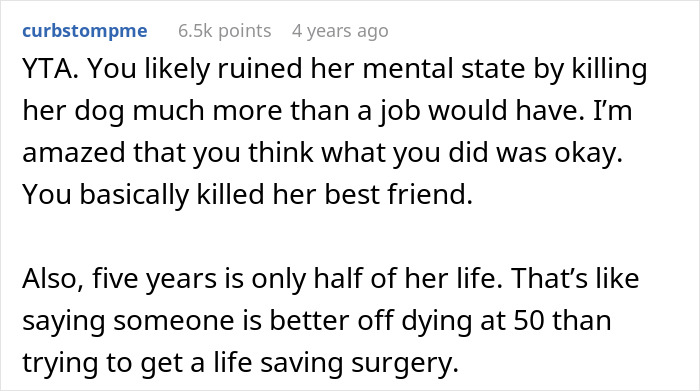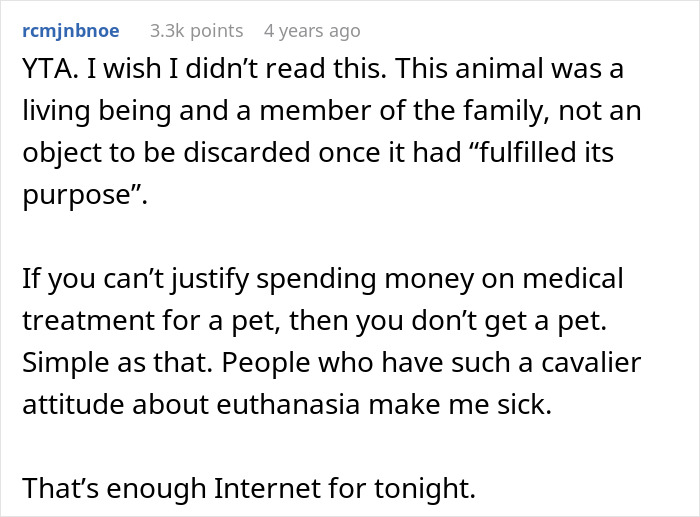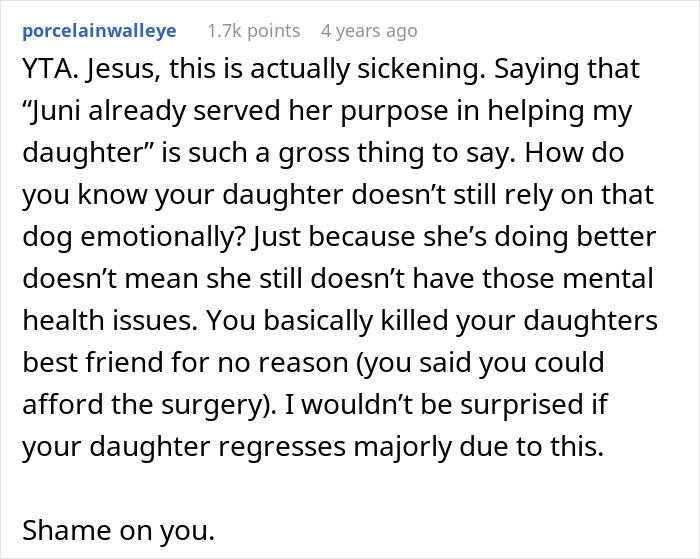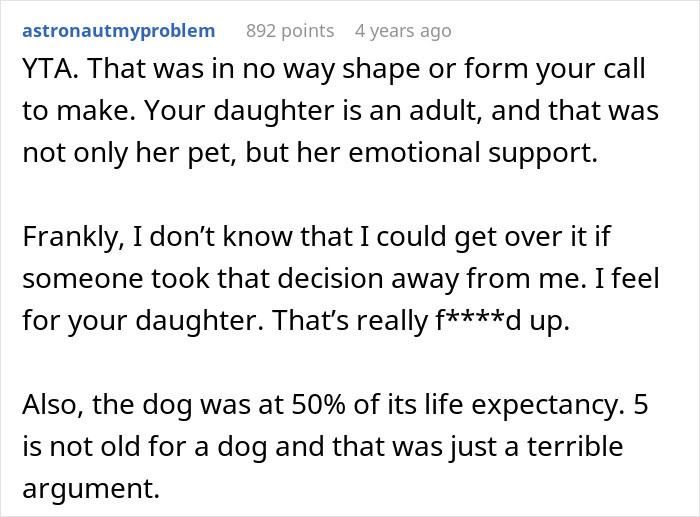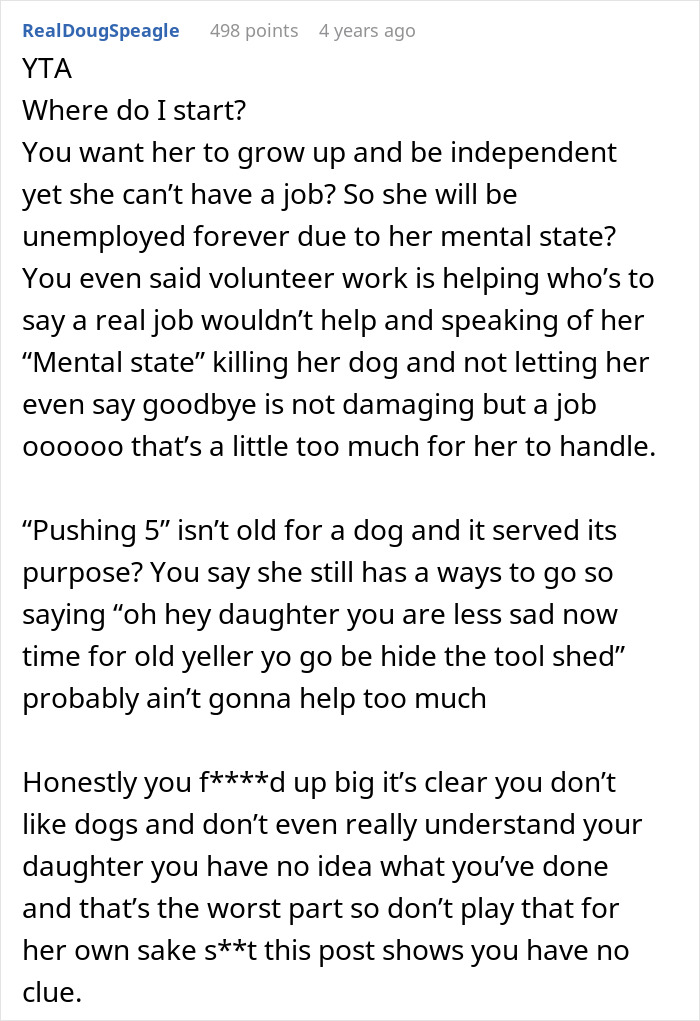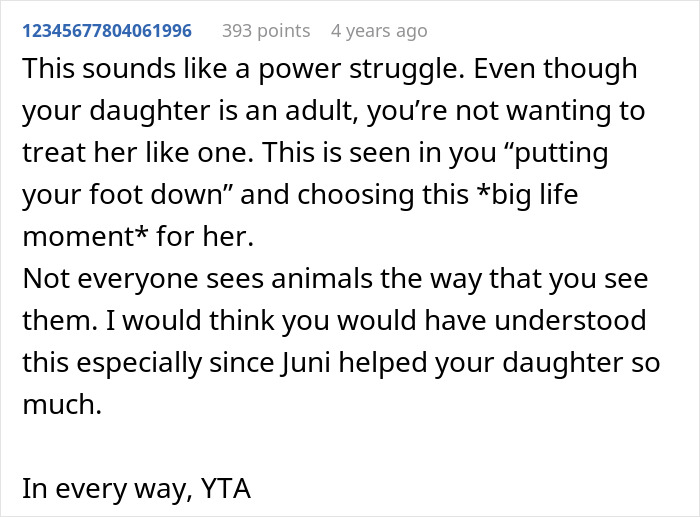We’ve long noticed that pets bring an immediate sense of comfort, but they can be especially helpful for people suffering from conditions like epilepsy, depression, anxiety, or post-traumatic stress disorder (PTSD). Having an emotional support animal by their side can help them reduce loneliness, stress, and alertness to danger.
For this family, having an emotional support dog helped their daughter, who is struggling with several disorders, feel more independent and confident. However, they were only able to get four years together before the pet was tragically hit by a car. The dad refused to pay the steep $2000 vet bill and found an alternative, majorly freaking out his daughter.
Scroll down to find the full story and a conversation with Katie Lawlor, a doctor of clinical psychology, and a pet loss grief recovery specialist, Helen Goldberg, who kindly agreed to tell us more about the process of grieving a lost pet.
Emotional support animals are great at helping someone struggling with depression, anxiety, or PTSD

Image credits: gpointstudio (not the actual image)
However, this daughter’s emotional support dog was euthanized because her dad refused to pay a steep vet bill
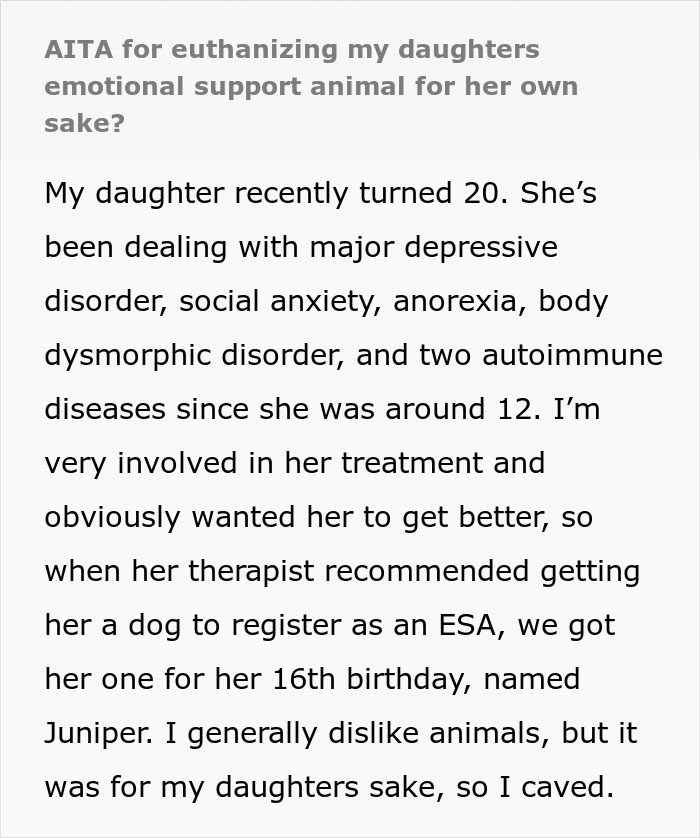



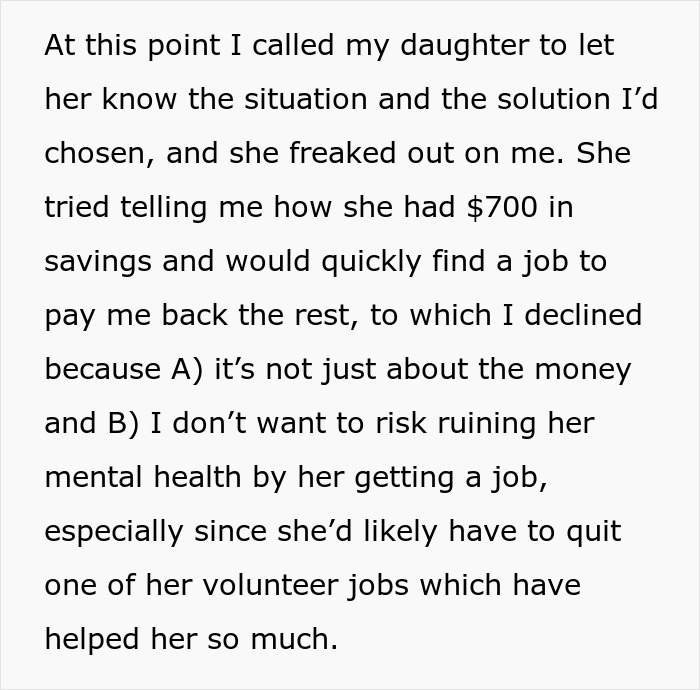

Image credits: Prostock-studio (not the actual image)
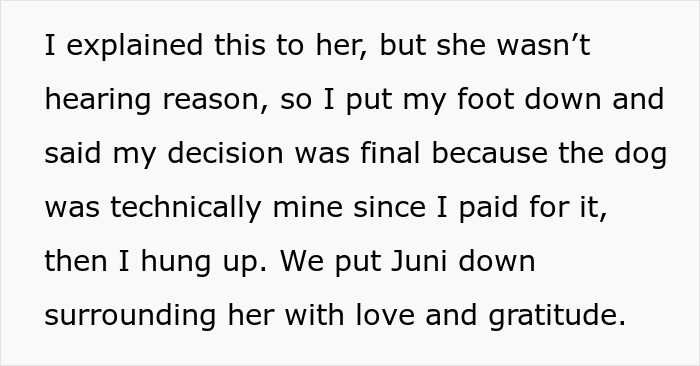
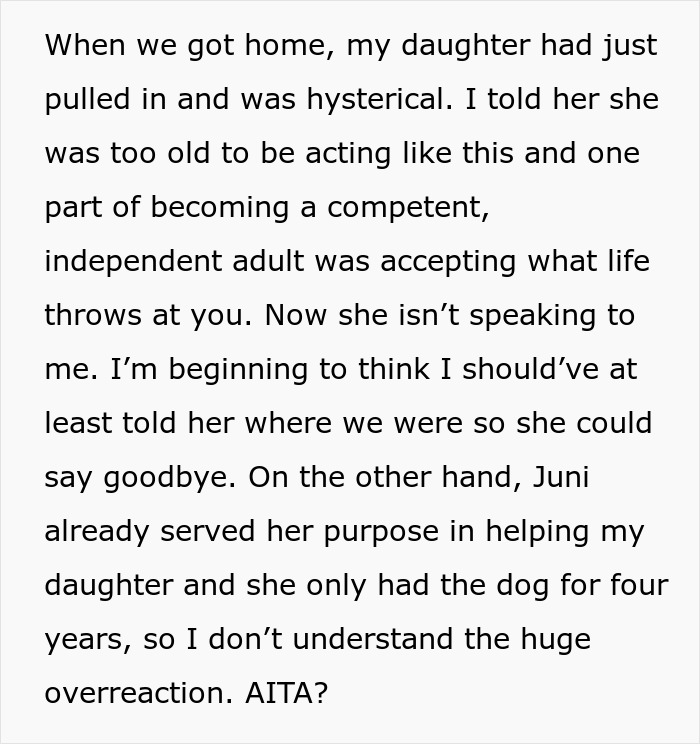




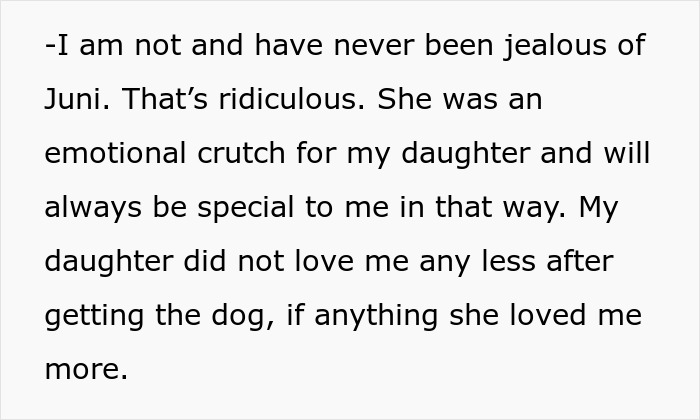
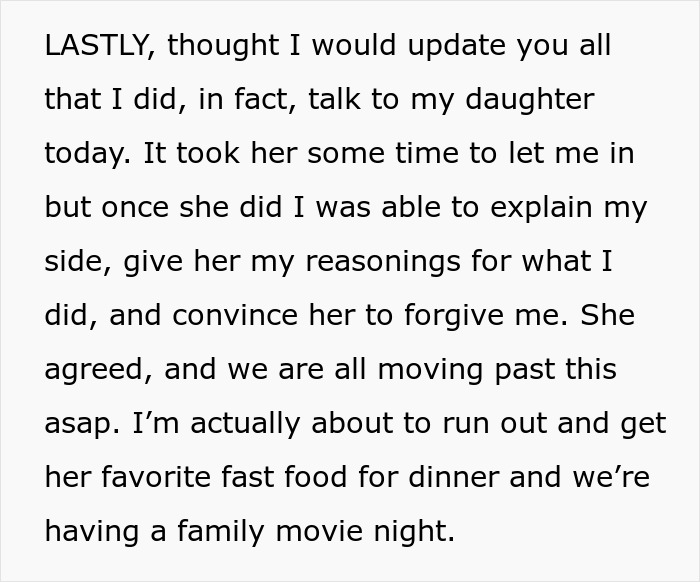


Image credits: [deleted]
Losing a pet to euthanasia is especially difficult, as the decision-making can feel like a heavy and painful responsibility

Image credits: DragonImages (not the actual photo)
Knowing that pets play an important part in many people’s lives, losing one can be a painful experience, similar to one of a loved human. If the animal was a working, service, or therapy dog, the person would not only be mourning a furry friend but also the loss of a coworker, independence, and emotional support.
Losing a pet to euthanasia is especially difficult, as the decision-making can feel like a heavy and painful responsibility. Bored Panda reached out to Katie Lawlor, a doctor of clinical psychology, and a pet loss grief recovery specialist, Helen Goldberg, who kindly agreed to tell us more about the process of grieving a lost pet.
Lawlor explains that a furry friend’s death can have a long-lasting effect. “Losing a companion animal, like losing a human loved one, leaves an extraordinary void in our lives. I don’t believe we ever move on from this loss; rather, scar tissue grows over the wound and our heart manage to keep beating. The rawness of grief comes from losing the animal that, no matter what happened out in the world that day, could fix everything once we were together. They were our home, and their closeness was a source of safety.”
She further mentions that grief is not linear. A person may feel strong one instant, then absolutely devastated the next. In particular, the first few weeks or months may feel completely surreal.
Goldberg says that after losing a pet, one of the most frequently spoken statements she hears from grieving pet parents is, “I am devastated, I feel like I am going crazy. Is there something wrong with me?”
She suggests that “The aforementioned statement is neither complicated nor long, yet it does carry much weight. Behind the words are feelings of shame, loneliness, fear, misunderstanding, judgment, and isolation, to name a few.”
Pets often give people purpose, company, and stability, and after they’re gone, the owner is confronted with deafening silence, overwhelming loneliness, no one to take care of, and no one to share their space with. “One’s home should be a place of happy memories that they shared with their pet, instead, it has become a place they want to escape; too much silence, too much stillness, too much sadness, and too many triggers,” she adds.
The process can be made easier by spending quality time together and knowing what to expect

Image credits: mstandret (not the actual photo)
In cases where the pet’s passing away is planned, Lawlor advises to be as present as possible in the moment. She even proposes the option of taking sick leave or some time off to spend more quality time together.
Another option she suggests is creating a plan with a veterinarian to help relieve some of the anxiety of the unknown about the decision-making process near the end of life. “Questions you might want to ask include options for having the vet come to your home that day, and how you would like to receive your animal’s remains – there are so many beautiful ways to memorialize them from urns to ashes jewelry,” she adds.
“I fully appreciate this is a conversation all of us dread, but the more prepared we can be with regard to logistics and practicalities, the more stable we will feel when the time comes. Finally, and perhaps most importantly, coming to the gentle understanding that you will know what to do, I promise. Trust your heart,” Lawlor says.
Goldberg agrees that something that can make the process of euthanasia easier is knowing what to anticipate. “Knowledge is power and equips a pet parent with what to expect. Some pet parents check off a bucket list over the last several weeks, sharing timeless memories, taking pictures and videos, and journaling the memories. Unfortunately, not every pet parent gets the time to do the above as the loss may come quicker than anticipated or the pet’s death is totally unexpected,” she says.
Someone who lost a pet can be supported by a loved one’s presence
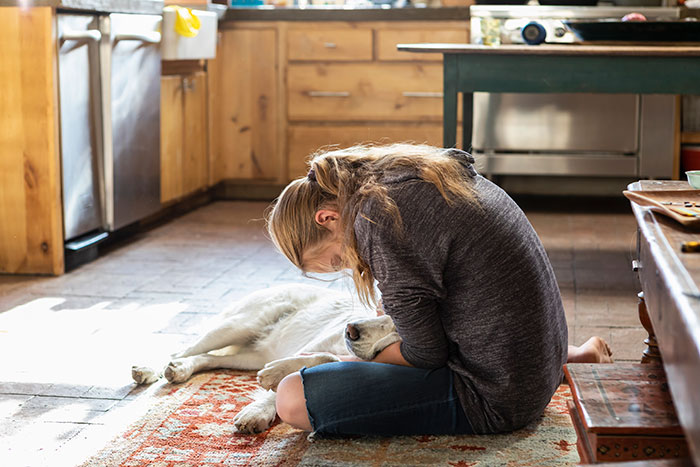
Image credits: Mint_Images (not the actual photo)
When asked what can be done to support someone who has lost a pet, Lawlor recommends letting them know that they’re in your thoughts and your heart. “This can be as simple as a quick text message: “Please know I’m thinking of you, and I am here if I can ever be a source of comfort.
Often, we are afraid to say the wrong thing in grief, so we say nothing at all. Given this, it is absolutely ok to say something along the lines of “I don’t know the right words to say to you at this moment, but please just know you are in my heart.” I always add the words “no need to respond” at the end, as I don’t want the guardian to feel any obligation to reply.”
She notes that oftentimes the pet parent may feel overwhelmed and therefore unable to communicate what they need. “I would encourage you to think of what might be most helpful to them without expecting a follow-up response. Some may want company during this time, while others will gravitate toward privacy. An emailed gift certificate to a favorite restaurant or coffee shop is always appreciated, as is a donation in the name of the animal who has passed to a cause the guardian cares deeply about,” advises Lawlor.
Goldberg also emphasizes the importance of being present. “Give the pet parent a shoulder to lean on, don’t abandon them because you are feeling inadequate or uncomfortable, make yourself available, and do not ignore their loss.”
Something she notes you shouldn’t do is tell them that everything is going to be fine, as for them it doesn’t feel like it will. Additionally, don’t suggest getting another pet to fill the void or keep themselves distracted. “When someone is in the throws of grief, they need to be allowed to feel, think, and respond in whatever way comes naturally. For the person who has lost their pet, give yourself permission and grace to grieve and heal. Like any deep wound, it will take time,” she says.
Commenters found the father to be completely in the wrong
